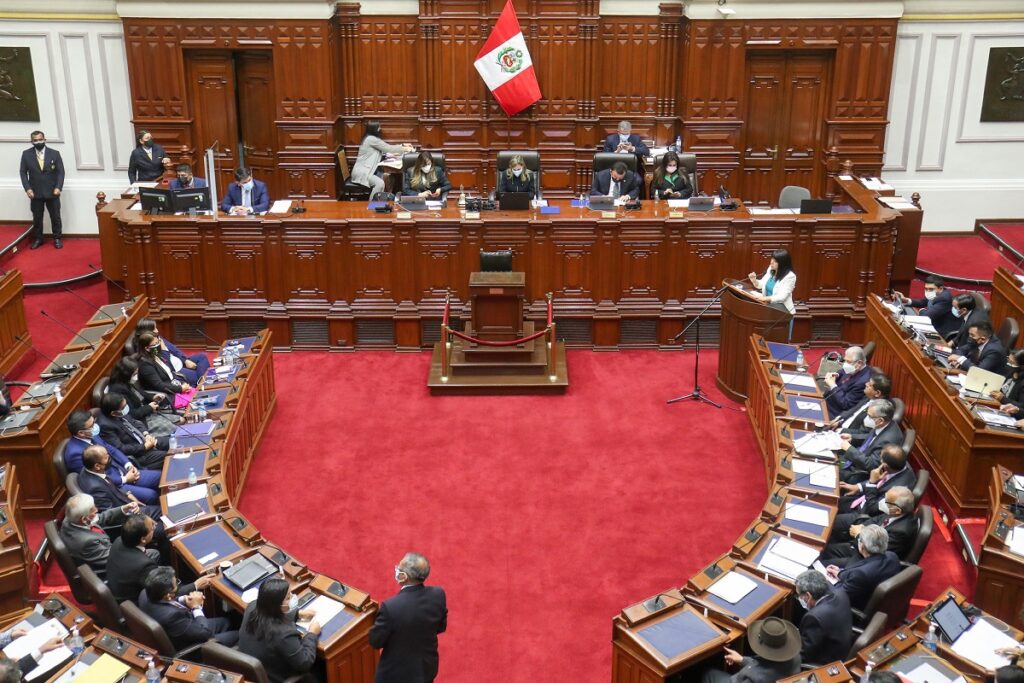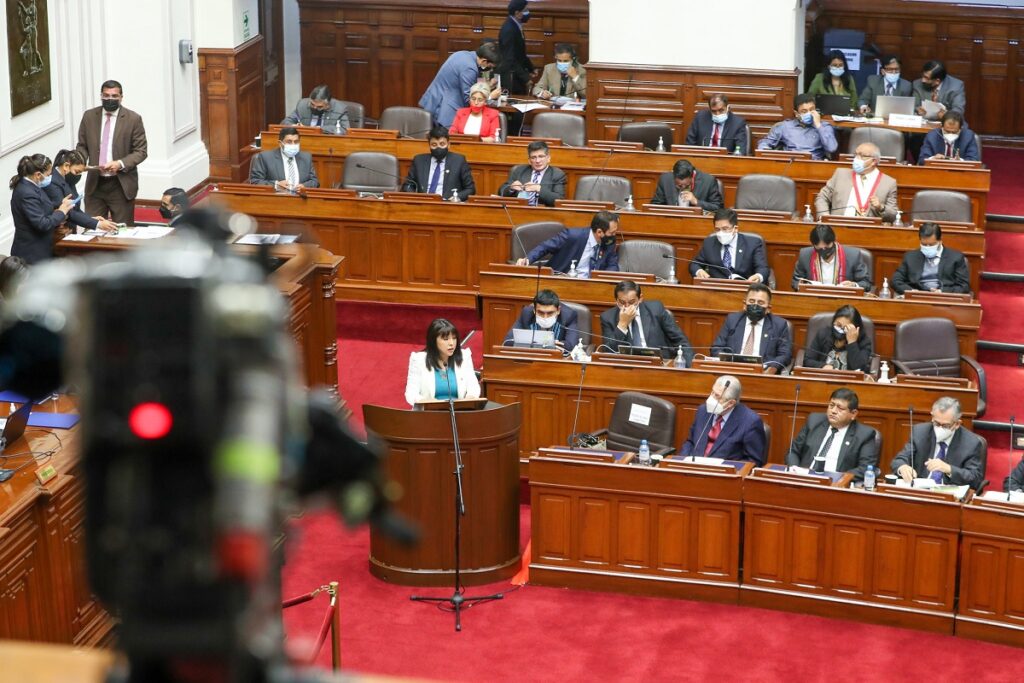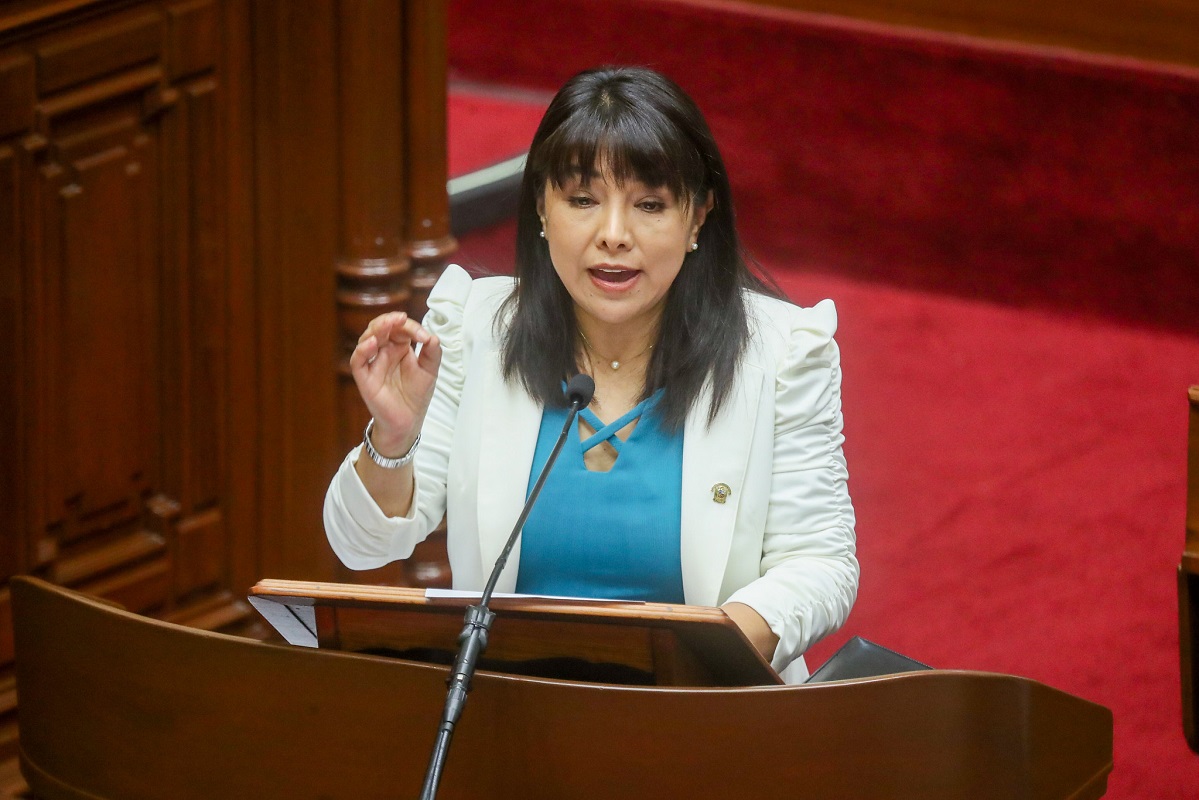Agencia Peruana de Noticias PRENSAPERU.PE https://prensaperu.pe Twitter: @prensaperupe Porque el hambre y la exclusión no esperan, la presidenta del Consejo de Ministros, Mirtha Vásquez Chuquilin, planteó al Congreso un renovado pacto constitucional que se sustente en objetivos comunes a favor de la igualdad, de la lucha contra la corrupción, de reducción de la pobreza y de la reactivación económica con justicia.
Así lo señaló el lunes 25 en su presentación ante el Pleno del Congreso, a donde acudió acompañada de su gabinete ministerial para exponer los principales lineamientos de la política general del Gobierno y solicitar se le otorgue el voto de confianza.
Vásquez Chuquilín respaldó su propuesta en la confianza que tiene en la buena fe de los grupos políticos con representación en el Congreso y la capacidad de construir -en conjunto- para encaminar al país hacia la gobernabilidad y al bienestar colectivo.
La presidenta del Consejo de Ministros manifestó su propósito de corresponder al anhelo ciudadano de lograr consensos y trabajar conjuntamente; por el contrario, observó que la inestabilidad afectaría nuestro sistema democrático.
“Esta situación no solo es negativa para nuestro aún frágil sistema democrático, sino que dificulta implementar las políticas públicas que necesita el país con urgencia. El hambre y la exclusión no esperan”, afirmó.
Mirtha Vásquez Chuquilín expuso los detalles de la política general del Gobierno que prioriza los derechos básicos de la población con énfasis en los ciudadanos históricamente excluidos y más vulnerables. “Todos los poderes del Estado necesitamos empujar en una misma dirección para construir una sociedad en la que no existan ciudadanos de segunda clase, por etnia, género, orientación sexual, idioma o edad”, dijo.

PANDEMIA
También, se contempla potenciar las acciones de lucha contra la pandemia de la COVID-19, fortaleciendo la atención en todos los niveles: vacunación y atención hospitalaria óptima. “Perú promoverá un acuerdo mundial para garantizar el acceso universal a las vacunas para todos y todas sin discriminación ni privilegios”, agregó.
Anunció que el Ministerio de Salud y EsSalud vienen implementando estrategias de vacunación enfocadas en la población objetivo, lo cual permitirá que en julio del 2022 se cuente con 130 centros de vacunación a nivel nacional, se tendrá más de 3500 camas de hospitalización en centros de atención y aislamiento temporal, con personal de salud, suministro de oxígeno medicinal y todo el equipamiento necesario para la atención oportuna de pacientes afectados por la COVID-19 a nivel nacional.
La presidenta del Consejo de Ministros afirmó que se ha desarrollado un plan de respuesta ante una posible tercera ola que tendrá entre sus principales objetivos prevenir y controlar la transmisión comunitaria, detectar oportunamente los casos, fortalecer la capacidad de atención en los servicios de salud, mejorar la disponibilidad y competencias del recurso humano, y la disponibilidad de suministros estratégicos.
SEGUNDA REFORMA AGRARIA
En la política de Gobierno también se ha considerado el cierre de la brecha agraria y rural con la segunda reforma agraria que busca terminar con el abandono sistemático de la agricultura familiar, de las comunidades campesinas y nativas. “La segunda reforma agraria implica también una reforma del Estado y de la forma de gobernar para el Perú rural”, sostuvo Vásquez.
Informó que para ese propósito se ha creado el Gabinete de Desarrollo Agrario y con el acompañamiento del Consejo Nacional de Desarrollo Agrario y Rural se encargará de ejecutar y supervisar políticas articuladas por los gobiernos subnacionales en los diversos territorios de nuestro país.
Descartó la expropiación de tierras y subrayó que lo que se busca es darle mayor valor agregado a la producción rural a través de procesos de transformación productiva que permita industrializar los productos agrícolas.
Complementario a ello, también se prestará especial atención a la seguridad alimentaria con la ampliación de cobertura de Qali Warma, ollas comunes y comedores populares; así como la lucha contra la desnutrición infantil y la anemia.
Además, se ha considerado la inclusión social y programas sociales, el desarrollo infantil temprano; asimismo se brindará asistencia económica de niñas, niños y adolescentes que se encuentran en estado de orfandad, debido a la pandemia y se atenderá a los adultos mayores con la ampliación del programa Pensión 65. Así también se fortalecerá los programas Juntos y Yanapay para beneficiar a más peruanos
REACTIVACIÓN ECONÓMICA
Otra política del Gobierno está enfocada a la reactivación económica con justicia social. Vásquez Chuquilín indicó que el objetivo es que para el 2021 crezcamos más del 10.5 % y para el 2022, más del 4.8 %, con un promedio de 5,5 % en el periodo 2021-2025.
Destacó la importancia de promover la inversión privada para impulsar el crecimiento económico y para generar empleo y mayores ingresos a las familias peruanas. “Durante el último trimestre del 2021 se planea adjudicar proyectos de asociaciones público privadas y proyectos en activos por US$ 871 millones, que incluyen la planta de tratamiento de aguas residuales en Puerto Maldonado y el Parque Industrial de Ancón”, dijo.
Agregó que durante el 2022 se planea adjudicar dos proyectos adicionales con una inversión de US$ 466 millones: la Línea de Transmisión Piura Nueva Frontera y las Bandas de Espectro Radioeléctrico AWS y 2.3 Ghz.
Señaló que el Gobierno de turno impulsará más inversiones con mayor redistribución; así como el fortalecimiento de las cadenas productivas en pesca y acuicultura y en cadenas productivas agrícolas. Además, se promoverá la promoción y reactivación de la actividad turística.

EMPLEO
Mirtha Vásquez anunció que, a través del Programa Nacional para la Empleabilidad, 11,250 personas serán beneficiadas hasta julio de 2022 con servicios de capacitación laboral, capacitación para el autoempleo, certificación de competencias laborales y becas “Jóvenes Bicentenario”, de manera virtual, dotándolos de herramientas y reforzando sus habilidades para facilitar su acceso al mercado laboral formal.
También, se orientará el trabajo para alcanzar la meta de instalar -a julio del 2023- 10 nuevas plataformas de inspección del trabajo cercanas a la clase trabajadora y sus centros de trabajo, lo que permitirá contar con 17 plataformas de inspección del trabajo a nivel nacional.
REFORMA TRIBUTARIA
Mirtha Vásquez anunció que solicitarán facultades para legislar en materia tributaria un marco normativo impositivo más justo, progresivo y equitativo.
“Los recursos logrados de la reforma tributaria tendrán objetivos específicos: se orientarán a cerrar brechas en los sectores educación y salud, a incrementar la conectividad con inversiones en caminos rurales y en conexiones a internet, y a apoyar la adaptación de las poblaciones al calentamiento global mediante inversiones en pequeña infraestructura para el riego y la mejor gestión del agua”, detalló.
LUCHA CONTRA LA CORRUPCIÓN
Mirtha Vásquez señaló que se potenciará la política nacional de integridad y lucha contra la corrupción, la que contará con la definición de nuevos lineamientos y una hoja de ruta con participación de entidades claves del sector público, el sector privado, los gremios y la sociedad civil. El resultado de este esfuerzo se concretará -antes de finalizar el año- con la publicación de un decreto supremo con la nueva política nacional de integridad y lucha contra la corrupción hacia el 2030.
También, se aprobará la estrategia de prevención de la corrupción del Poder Ejecutivo al 2022, que tiene como objetivos: asegurar la probidad e idoneidad en el ejercicio de la función pública, fortalecer la transparencia y la rendición de cuentas, fortalecer la institucionalidad y la mejora continua y fortalecer el control social y la denuncia.
Antes de culminar su exposición, Mirtha Vásquez reiteró su pedido al Congreso de caminar hacia un horizonte de diálogo y arduo trabajo. De igual modo, repitió su compromiso con la ciudadanía por hacer las cosas bien.
“Con estas palabras, doy por culminada mi exposición de la política general del Gobierno y solicito respetuosamente el voto de confianza para poner en acto cada una de las medidas aquí expuestas”, concluyó.
Fuente: Agencia Peruana de Noticias PRENSAPERU.PE https://prensaperu.pe Twitter: @prensaperupe
English translation
A constitutional pact that cements stability and democracy, summarizes the request for the vote of confidence of Prime Minister Mirtha Vásquez.
Peruvian News Agency PRENSAPERU.PE https://prensaperu.pe Twitter: @prensaperupe Because hunger and exclusion do not wait, the president of the Council of Ministers, Mirtha Vásquez Chuquilin, presented to Congress a renewed constitutional pact that is sustained in common objectives in favor of equality, the fight against corruption, poverty reduction and economic reactivation with justice.
This was stated on Monday 25 in his presentation before the Plenary of Congress, where he went accompanied by his ministerial cabinet to present the main guidelines of the general policy of the Government and request that he be granted a vote of confidence.
Vásquez Chuquilín supported his proposal on the confidence he has in the good faith of the political groups represented in Congress and the ability to build – together – to guide the country towards governance and collective well-being.
The president of the Council of Ministers stated her intention to correspond to the citizen’s desire to achieve consensus and work together; on the contrary, he observed that instability would affect our democratic system.
“This situation is not only negative for our still fragile democratic system, but it also makes it difficult to implement the public policies that the country urgently needs. Hunger and exclusion do not wait ”, he affirmed.
Mirtha Vásquez Chuquilín explained the details of the government’s general policy that prioritizes the basic rights of the population with an emphasis on historically excluded and most vulnerable citizens. “All the powers of the State need to push in the same direction to build a society in which there are no second-class citizens, based on ethnicity, gender, sexual orientation, language or age,” he said.

PANDEMIC
Also, it is contemplated to strengthen actions to fight the COVID-19 pandemic, strengthening care at all levels: vaccination and optimal hospital care. “Peru will promote a global agreement to guarantee universal access to vaccines for all without discrimination or privileges,” he added.
He announced that the Ministry of Health and EsSalud have been implementing vaccination strategies focused on the target population, which will allow that in July 2022 there will be 130 vaccination centers nationwide, there will be more than 3,500 hospital beds in care centers and temporary isolation, with health personnel, medical oxygen supply and all the necessary equipment for the timely care of patients affected by COVID-19 at the national level.
The president of the Council of Ministers affirmed that a response plan has been developed in the face of a possible third wave that will have among its main objectives the prevention and control of community transmission, timely detection of cases, strengthening the capacity of care in health services, improving the availability and competencies of human resources, and the availability of strategic supplies.
SECOND AGRARIAN REFORM
The government policy has also considered closing the agrarian and rural gap with the second agrarian reform that seeks to end the systematic abandonment of family farming, peasant and native communities. “The second agrarian reform also implies a reform of the State and the way of governing for rural Peru,” said Vásquez.
He reported that for this purpose the Agrarian Development Cabinet has been created and with the accompaniment of the National Council for Agrarian and Rural Development, it will be in charge of executing and supervising policies articulated by subnational governments in the various territories of our country.
He ruled out the expropriation of land and stressed that what is sought is to give greater added value to rural production through processes of productive transformation that allow the industrialization of agricultural products.
Complementary to this, special attention will also be paid to food safety with the expansion of the coverage of Qali Warma, common pots and soup kitchens; as well as the fight against child malnutrition and anemia.
In addition, social inclusion and social programs have been considered, early childhood development; Likewise, economic assistance will be provided to girls, boys and adolescents who are orphaned due to the pandemic, and the elderly will be served with the expansion of the Pension 65 program. The Juntos and Yanapay programs will also be strengthened to benefit more peruvians
ECONOMIC REACTIVATION
Another government policy is focused on economic reactivation with social justice. Vásquez Chuquilín indicated that the objective is that by 2021 we grow more than 10.5% and by 2022, more than 4.8%, with an average of 5.5% in the 2021-2025 period.
He highlighted the importance of promoting private investment to boost economic growth and to generate employment and higher income for Peruvian families. “During the last quarter of 2021, it is planned to award projects from public-private associations and projects in assets for US $ 871 million, which include the wastewater treatment plant in Puerto Maldonado and the Ancón Industrial Park,” he said.
He added that during 2022 it is planned to award two additional projects with an investment of US $ 466 million: the Piura Nueva Frontera Transmission Line and the AWS and 2.3 Ghz Radio Spectrum Bands.
He pointed out that the current government will promote more investments with greater redistribution; as well as the strengthening of productive chains in fishing and aquaculture and in agricultural productive chains. In addition, the promotion and reactivation of tourist activity will be promoted.

JOB
Mirtha Vásquez announced that, through the National Program for Employability, 11,250 people will be benefited until July 2022 with job training services, training for self-employment, certification of job skills and “Young Bicentennial” scholarships, virtually, endowing them with tools and strengthening their skills to facilitate their access to the formal labor market.
Also, work will be oriented to achieve the goal of installing -by July 2023- 10 new labor inspection platforms close to the working class and their work centers, which will allow having 17 labor inspection platforms nationwide. .
TAX REFORM
Mirtha Vásquez announced that they will request powers to legislate in tax matters a more just, progressive and equitable tax regulatory framework.
“The resources obtained from the tax reform will have specific objectives: they will be aimed at closing gaps in the education and health sectors, increasing connectivity with investments in rural roads and internet connections, and supporting the adaptation of populations to global warming through investments in small infrastructure for irrigation and better water management ”, he explained.
FIGHT AGAINST CORRUPTION
Mirtha Vásquez pointed out that the national policy of integrity and the fight against corruption will be strengthened, which will include the definition of new guidelines and a roadmap with the participation of key entities of the public sector, the private sector, unions and civil society . The result of this effort will materialize -before the end of the year- with the publication of a supreme decree with the new national policy of integrity and the fight against corruption by 2030.
Also, the strategy for the prevention of corruption of the Executive Power by 2022 will be approved, which aims to: ensure probity and suitability in the exercise of public function, strengthen transparency and accountability, strengthen the institutional framework and improve continuous and strengthen social control and reporting.
Before concluding her presentation, Mirtha Vásquez reiterated her request to Congress to move towards a horizon of dialogue and hard work. Similarly, he repeated his commitment to citizens to do things well.
“With these words, I conclude my presentation of the general policy of the Government and I respectfully request the vote of confidence to implement each of the measures set out here,” he concluded.
Source: Peruvian News Agency PRENSAPERU.PE https://prensaperu.pe Twitter: @prensaperupe
